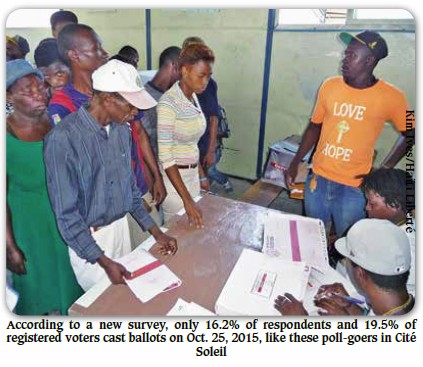|
 A
new report by Brazil’s Igarapé Institute, to be released
on Feb. 3, reveals that less than 20% of Haiti’s
electorate, a new record low, participated in the Oct.
25, 2015 parliamentary and presidential election, not
26% as claimed by Haiti’s discredited and now collapsing
Provisional Electoral Council (CEP).
Furthermore, less than 3% of potential voters had
planned to take part in the now indefinitely postponed
Jan. 24 elections’ third round, mostly due to dismay
with election fraud and corruption, the report says.
Nonetheless, about 75% of respondents said they
“would vote if they were confident the elections were
free and fair,” the report found.
Entitled “Assessing
Haiti’s Electoral Legitimacy Crisis – Results of a 2016
Survey,” the report is based on a national survey of
1,766 Haitian adults conducted between Jan. 17-22, 2016.
The report was written by Athena R. Kolbe and Robert
Muggah, who co-authored an important 2006
Lancet study
on human rights abuses during the de facto government of
Prime Minister Gérard Latortue after Haiti’s 2004 coup
d’état.
In November, the Igarapé Institute published the
results of an exit poll during the Oct. 25 election
which showed Jovenel Moïse coming in fourth with just 6%
of the vote, not 33% as published by the CEP. The
Igarapé Institute calls itself “an independent think and
do tank
devoted to evidence-based policy and action on complex
social challenges.”
“ The country is sliding into a political crisis
without precedent,” the authors note in the report’s
introduction. “Haiti’s current crisis is not just about
the elections, but the constitution itself. There is no
provision in the Haitian constitution for a transition
of power after a president’s term expires in the event
that elections have not been held.”
Among other report findings:
● Some 83% of those surveyed
believe that Haiti is headed in the wrong direction,
particularly young people, agricultural laborers,
factory workers, and the poorest quarter of the
population. “When asked if President Martelly should
step down on or before Feb. 7, 2016, more than three
quarters of respondents said that he should resign as
president, even if a new president has not yet been
elected.”
● Almost 83% of those surveyed were
or had been registered to vote, indicating no
generalized voter apathy.
● About 68% of respondents said
they wouldn’t vote in the Jan. 24 election due to voter
fraud, suggesting that the majority of Haiti’s
population agree with Haiti’s opposition.
“Given the history of repeated coup d’états in
Haiti, it is absolutely crucial that President Martelly
step down on Feb. 7, as planned,” the authors conclude
in their 24-page report. “This would help renew trust in
the democratic process and demonstrate a commitment to
the peaceful transition of power despite the lack of constitutional guidance for this specific situation.”
|